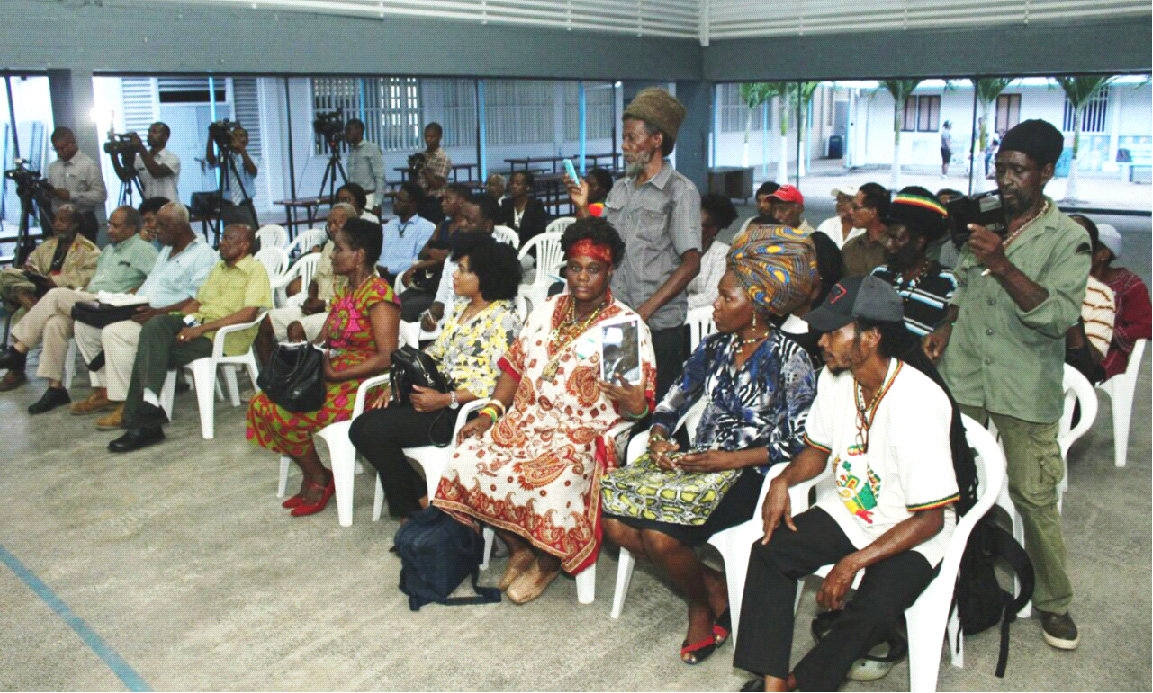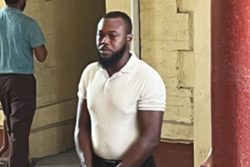Activists renewed calls for the decriminalisation of marijuana and for the regulation of its use on Monday, when a consultation was hosted by Caricom’s Regional Commission on Marijuana.
The event, which was held at the St. Stanislaus College, saw a turnout of over 50 persons, including social activist Nicole Cole, a member of the Society for Marijuana Activists for Reform and Treatment (SMART), who voiced her support for the decriminalisation of small amounts of the drug and other changes to the draconian laws that govern the substance.
Referencing a recent visit to the New Amsterdam prison, Cole said she interacted with a 77-year-old female prisoner, who had been incarcerated for being in possession of marijuana stems and leaves that she used to brew tea.
“She came and begged for me to do something. They told her that she needed $600,000 to appeal her case. You would’ve asked if the law is equitable or only affects the poor. I can say to you that she is poor and powerless and that is why she is in there,” Cole told members of the commission.
She explained that SMART is working on various amendments to the Narcotics Drug and Psychotropic Substances (Control) Act, which governs the possession and use of marijuana.
The group is aiming to spare persons caught with small amounts of marijuana from being arrested or being charged in a court of law or having their names in the criminal record books. Instead, it proposes a small fine of no more than $1,000 for possession.
It is also calling for the striking out of jail sentences for pipes and utensils.
It is also advocating allowances for the use of the plant for religious, medical and scientific research and for Rastafarians to be able to use it in registered locations of worship.
SMART is also advocating for households to be able to legally grow up to five plants and for foreigners visiting Guyana to be able to receive permits to lawfully purchase and use marijuana. She added that the group is also advocating for the establishment of a Marijuana Licensing Authority to enable the lawful regulation of its use.
Although governing APNU+AFC MP Michael Carrington had tabled a bill to relax penalties for marijuana possession, there has been no movement on it in the House.
Currently, under Guyana’s Narcotic Drugs and Psychotropic Substances (Control) Act of 1988, possession of 15 grammes and over of cannabis attracts a charge of possession of narcotics for the purpose of trafficking. Any person summarily convicted of the offence is liable to a sentence of at least three years but no more than five years in prison and a fine of at least $30,000 or the equivalent of three times the street value of the drug.
Businessman Dr. Turhane Doerga also made a presentation and explain-ed that the Netherlands, which has legalised marijuana, should be used as a reference point as the commission carries out its consultations and studies. Doerga made special reference to the large numbers of unoccupied jails in the country. “They have concluded 30 years ago that when you compare it to alcohol, that marijuana is a saint,” Doerga said.
Also making a contribution at the consultation was Ras Leon Saul, General Secretary of the Healing the Nation Theocracy Party, who expressed his support for the legalisation of the drug. He said he is also willing to accept its decriminalisation. Saul recalled being charged and fined in 2014 for having a gramme of marijuana, which he said influenced him to become an advocate for the relaxation of the laws, since the drug is part of the Rastafarian lifestyle.
Calls were also made from other representatives from civil society for the drug’s legalisation. Some produced statistics from studies that have been done and explained that, scientifically, the plant should not be illegal.
Additionally, one of the contributors said he felt that the meeting was not publicised enough. Some also raised concerns about the amount of decriminalisation/legalisation activists that were part of the consultation, and explained that it should cover a wider area, including persons who support the illegal status of the drug.
The mandate of the regional commission is to “conduct a rigorous enquiry into the social, economic, health and legal issues surrounding marijuana use in the Caribbean and to determine whether there should be a change in the current drug classification of marijuana thereby making the drug more accessible for all types of usage (religious, recreational, medical and research).”
Chair of the Commission Rose-Marie Belle-Antoine, the Dean of the Law Faculty of the University of the West Indies, explained that the body was set up with the intention of gathering information pertaining to the views of the citizens of the Caribbean countries, which will then be compiled into a report and
presented to the Caricom heads of states for deliberation.
“The main purpose of this consultation is to consult, to listen. It’s not for us to give you a lecture on what we think. In fact, we want to remain as independent, as unbiased as possible throughout the exercise,” Belle-Antoine said.
“We want to say we met with Caribbean people and were able to listen to what they have to say,” she added, while emphasising that there was a stark difference between legalisation and decriminalisation.
“…When we have listened to everyone, we will take the research on board—and a lot of it is coming from the University of the West Indies, who have been doing scientific research—and in our report we will be able to take into consideration the views we have heard but nevertheless, our own collective expertise,” she said.
The commission is made up of stakeholder representatives across several disciplines, including law, science and medicine, as well as religion and civil society.
Belle-Antoine added that the commission believes that a regional approach is useful and it has received feedback from Jamaica for assistance in how it has addressed the issue. “[A] regional approach is very important to us if we start thinking about some of the things we can do together. We have a regional health policy, so we have to think about what is the impact of that if some countries decriminalise and some don’t,” she pointed out.








